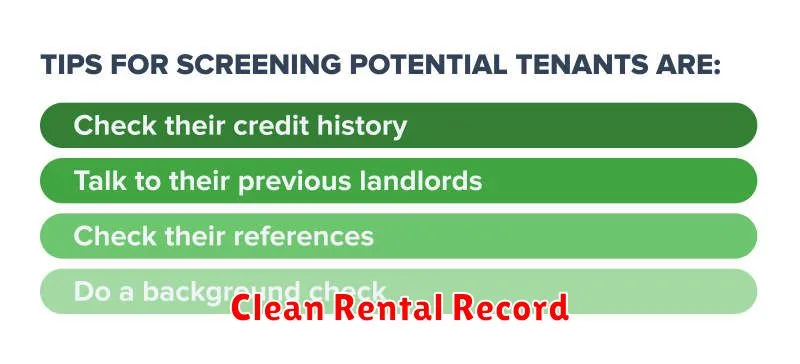Finding the ideal tenant is crucial for any landlord. Securing a reliable tenant can mean the difference between a smooth, profitable rental experience and a stressful, costly one. This article delves into the key criteria landlords consider when evaluating potential tenants, offering valuable insights for both landlords seeking the best renters and tenants aiming to present themselves as desirable candidates. Understanding what landlords look for in a tenant, such as a strong credit history, verifiable income, positive references, and responsible rental history, is essential for success in the competitive rental market. We’ll cover the importance of these factors and provide actionable advice to help you navigate the tenant selection process.
Whether you’re a seasoned landlord or just starting out, choosing the right tenant is paramount. From credit checks and background checks to rental history and income verification, this guide will explore the multifaceted process of tenant screening. We’ll examine the red flags landlords look for and provide tips for tenants on how to make a positive impression. By understanding what constitutes a good tenant from a landlord’s perspective, you can increase your chances of securing your desired rental property or finding the perfect renter for your investment.
Stable Employment and Income
Consistent income is a primary factor landlords consider. They want assurance that tenants can reliably pay rent. Landlords often verify employment history and income through pay stubs, tax returns, or bank statements.
A stable employment history demonstrates responsibility and reduces the risk of late or missed rent payments. Long-term employment with the same company is generally viewed favorably.
Sufficient income is crucial. Landlords typically require tenants to earn a certain multiple of the monthly rent, often two or three times the amount. This helps ensure tenants can comfortably afford rent along with other living expenses.
Good Credit History
A strong credit history is a crucial factor for landlords when assessing potential tenants. It provides insight into an applicant’s financial responsibility and their ability to pay rent on time.
Landlords typically check credit reports to look for payment history, outstanding debts, and any negative marks such as collections or bankruptcies. A good credit score suggests a history of responsible financial management, which reassures landlords that rent payments are likely to be made consistently and on time.
A lower credit score, or a lack of credit history, can be a red flag. While it doesn’t automatically disqualify an applicant, landlords may require additional documentation, such as proof of income or a larger security deposit, to mitigate potential risks.
Clean Rental Record

A clean rental record is crucial for prospective tenants. Landlords want assurance that you’ll treat their property responsibly and pay rent on time. A history of late payments, evictions, or property damage can significantly hinder your chances of securing a lease.
Landlords typically verify rental history by contacting previous landlords. They’ll inquire about your payment history, adherence to lease terms, and overall behavior. Positive references from past landlords can greatly strengthen your application.
Respectful and Reliable Behavior
Landlords highly value tenants who treat their property and neighbors with respect. This includes maintaining reasonable quiet hours, properly disposing of trash, and addressing any concerns or issues promptly and politely. A respectful tenant fosters a positive living environment for everyone.
Reliability is also paramount. Landlords seek tenants who consistently pay rent on time and adhere to the terms of the lease. This predictable behavior minimizes disruptions and provides landlords with peace of mind. Demonstrating financial responsibility through a stable income and good credit history builds trust and strengthens your application.
No History of Eviction
A clean eviction history is crucial for prospective tenants. Landlords want assurance that you will uphold the terms of the lease and won’t cause legal or financial difficulties. An eviction on your record signals potential risk and can significantly hinder your chances of securing a rental.
Landlords often use tenant screening services that reveal past evictions. Even if you had a justifiable reason for a previous eviction, it is important to be prepared to address it openly and honestly with a potential landlord. Providing context and demonstrating changed circumstances can sometimes mitigate the negative impact of an eviction record.
Positive References from Previous Landlords
References from previous landlords are crucial. They offer valuable insights into your tenancy history. Landlords want to hear about your payment history, respect for the property, and overall adherence to the lease terms. A positive reference can significantly boost your application.
Landlords typically inquire about:
- Timeliness of rent payments: Did you pay on time and in full?
- Property upkeep: Did you maintain the cleanliness and condition of the property?
- Communication: Were you responsive and respectful in your communication with the landlord?
- Adherence to lease terms: Did you follow the rules and regulations outlined in the lease agreement?
Pet and Smoking Policies Compliance
Adherence to pet and smoking policies is crucial for a positive landlord-tenant relationship. Lease agreements typically outline specific rules regarding pets and smoking within the property. Landlords seek tenants who will respect these policies to maintain the property’s condition and ensure a comfortable environment for all residents.
Pet policies may include restrictions on breed, size, or number of pets allowed. Some properties may be entirely pet-free. Tenants should be prepared to provide information about their pets, such as vaccination records. Smoking policies often prohibit smoking inside the unit and sometimes within common areas or even on the property grounds. Compliance with these rules demonstrates respect for the property and other residents.
Ability to Pay Rent On Time
A landlord’s primary concern is receiving rent payments promptly. Consistent on-time payments demonstrate financial stability and responsibility, ensuring a steady income stream for the property owner.
Landlords often assess this ability by reviewing an applicant’s credit report, proof of income, and rental history. These documents provide insights into an applicant’s financial track record and ability to meet their financial obligations.
A strong credit score, stable employment, and positive references from previous landlords significantly increase the likelihood of being considered a desirable tenant.
Clear Communication Skills

Effective communication is crucial for a positive landlord-tenant relationship. Landlords appreciate tenants who communicate their needs and concerns clearly and respectfully. This includes promptly reporting maintenance issues and responding to landlord inquiries in a timely manner.
Open communication helps prevent misunderstandings and fosters a sense of trust. It enables landlords to address issues quickly, ensuring a smooth tenancy for both parties.
Understanding and Respecting Lease Terms
A strong applicant demonstrates a clear understanding of lease terms and a commitment to honoring them. Lease agreements are legally binding contracts, and landlords prioritize tenants who respect this. Carefully review each clause, including the length of the tenancy, rent amount, due date, and any specific restrictions.
Asking clarifying questions shows proactive engagement and helps avoid future misunderstandings. This indicates a responsible tenant who values clear communication and strives to uphold their end of the agreement. Respecting the lease demonstrates respect for the property and the landlord-tenant relationship.

